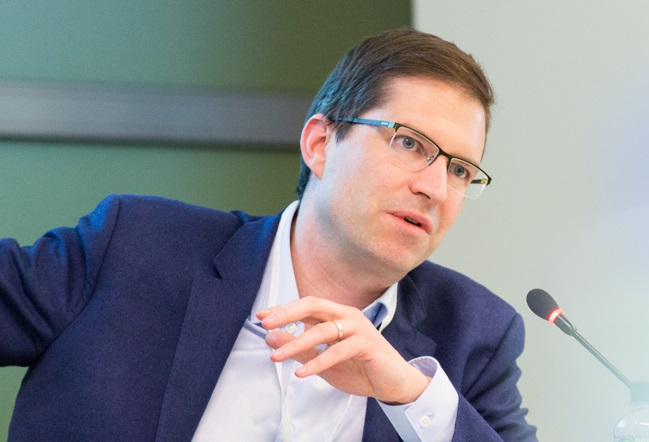
Photo: Busakorn Pongparnit | Dreamstime.com
Global cities join forces for a bigger say on telecoms
24 November 2022
by Sarah Wray
A new network aims to foster better collaboration between cities and the telecommunications industry.
Historically, cities have taken a largely passive role in the implementation of telecoms infrastructure – typically issuing permits and hoping for the best.
A number of intersecting trends mean this has to change, and cities are beginning to work together to have a stronger collective voice and collaboration with the telecoms industry.
COVID-19 highlighted stark inequities in digital access across cities that local governments are now trying to close, including by making better use of their assets such as lampposts, street furniture and buildings. The roll-out of 5G brings new challenges too, requiring small cells to be deployed more densely than previous generations of connectivity, which raises fresh concerns about the aesthetic impact on the urban landscape.
Jamie Cudden, Smart City Programme Manager for Dublin City Council, Ireland, told Cities Today: “With the move to 5G, cities are going to have to play a much more active role.

“A lot of people think that 5G is going to be a gamechanger. Maybe it’s not going to happen overnight but the type of companies, start-ups and research that your city can support if you’re creating those opportunities, I think could be quite significant.”
Cudden is calling for cities to collaborate to address the complexities and opportunities around telecoms issues. At an event held alongside Smart City Expo World Congress in Barcelona last week, Cudden and Michael Guerin, Connected Cities Engagement Lead at the Telecom Infra Project (TIP), hosted a roundtable, facilitated by the Cities Today Institute. Following virtual sessions attended by cities including Prague, Los Angeles, Cape Town, Barcelona and Belfast, it was the first in-person meeting of what it is hoped will become a long-term City Telecoms Forum.
Not so fast
The roots of the effort date back to around 2017 when Dublin put a call out to the market for ideas on gigabit connectivity and this led to a neutral host 5G network research trial in the city’s Docklands district.
“We thought it would be very quick and easy,” said Cudden. “But fibre, getting permissions and permits, getting power in created all sorts of issues.”
This spurred Dublin to take several steps including setting up a dedicated Telecoms Unit, which launched last year as a ‘one stop shop’ that cuts across departments and acts as the first point of contact for operators and infrastructure providers looking to invest or deploy connectivity in the city.
Dublin has also collaborated with the private sector through the Telecom Infra Project (TIP) to advance the deployment of small cells on shared assets.
TIP was originally launched by Facebook – now Meta – in 2016 to drive more flexibility into telecom networks and enable operators to mix and match equipment providers through concepts such as Open Radio Access Network (Open RAN), with the overarching goal of developing better networks faster to support richer experiences such as video, virtual reality and more recently the metaverse. The TIP project in Dublin was the first that was city-focused.

“There was an acknowledgement that you can get all of the connectivity stack right and you can work on all the technical challenges but if you can’t put it on the lamppost, and if you can’t deploy the equipment, it defeats the purpose,” said Guerin. “The big thing for TIP was: if you get the whole ecosystem in the room, you will be able to achieve a lot more, which is why they chose Dublin. But that needs to happen in every city.”
In a newly announced project, supported by Virgin Media Business, Dublin is installing Wi-Fi 6 Access Points that are compliant with TIP OpenWiFi as a trial of open, disaggregated solutions for potential use in the city’s public Wi-Fi network.
“A smart city is built around collaboration and openness. We are delighted to be trialling Wi-Fi options that are built with an open source architecture that enables multi-vendor interoperability,” said Cudden.
While Meta ‘seed funded’ TIP, the initiative is now member-led, said Guerin.
“[Meta] is taking a step back — they will still be involved, but they will be at a level playing field with all other large multinational companies,” he explained.
Power of many
Rather than cities all approaching the same challenges individually, there is now a call for them to also work together.
“I think cities can play an important role in terms of shaping the future and meeting the needs of cities,” said Cudden. “A lot of [equipment] like telecoms masts and small cells is very ugly. I think we can collectively push the vendors and the operators to do a better job in terms of the form factor, the aesthetics of the equipment.”
Cities could also push for greater adoption of models such as neutral-host shared networks.
“There’s a challenge in terms of space and if we don’t share and we don’t work collaboratively, we’re probably not going to have those super competitive, digitally connected cities that people talk about, with all the use cases and the exciting things you can innovate on top.”
Cities also need to understand telecoms companies better, such as cost issues – especially as inflation bites – and the practical obstacles they face in working with cities.
Guerin said: “There are two sides: there are the city expectations and demands as well as those of the telecoms companies and I think if you both embark on the journey together, you’ll get to a place where both will be happy. But if one sits back and lets the other one drive it, then we’ll probably end up in a place where there’ll be a disconnect in the not-too-distant future.”
New models
Guerin believes telecom companies are more open to greater collaboration with cities.
“[But] there is a challenge because the competitive advantage for telecoms operators in cities previously was that they had connectivity where others didn’t.”
Some operators have exclusivity deals in particular areas, for instance. The push for shared infrastructure disrupts this.
“That’s a journey that they will have to go on,” said Guerin. “And then they have to find a competitive advantage elsewhere.”
This could include through services and new commercial models.
“It would be naïve as a city to think you could implement that and everybody’s going to buy in and play ball,” he said. “I think you have to work with the telecoms industry.”
Now is a good opportunity, though, “because the telecoms industry are going through a significant transformation themselves”.
More cities from around the world are being encouraged to join the City Telecoms Forum, with plans for future sessions to focus on topics such as open data, asset mapping, engaging with the market and procurement. The goal is then to get telecom operators and vendors around the table for collaborative discussions.








